Developing, Using and Organising Resources in a Specialist Area
VerifiedAdded on 2023/06/18
|14
|3873
|275
AI Summary
This article discusses the purpose of resources in teaching and learning, evaluates the effectiveness of specific resources in Accounting Management, analyses principles of resource design, and ways in which resources can be adapted to enable an inclusive approach. It also covers the design of resources involving new and emerging technologies and evaluates the effectiveness of own design and use of resources in meeting individual needs of learners in Accounting Management.
Contribute Materials
Your contribution can guide someone’s learning journey. Share your
documents today.
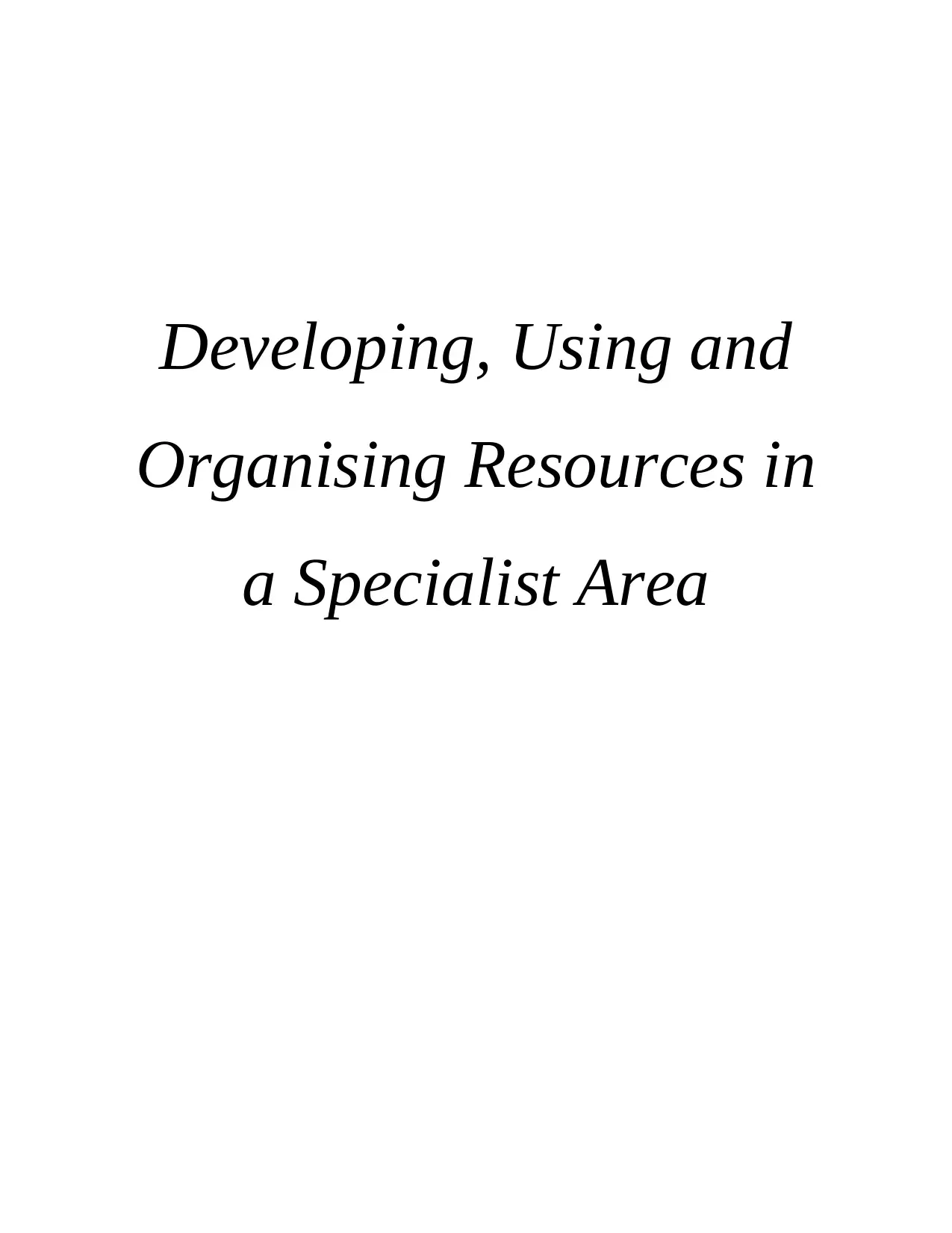
Developing, Using and
Organising Resources in
a Specialist Area
Organising Resources in
a Specialist Area
Secure Best Marks with AI Grader
Need help grading? Try our AI Grader for instant feedback on your assignments.
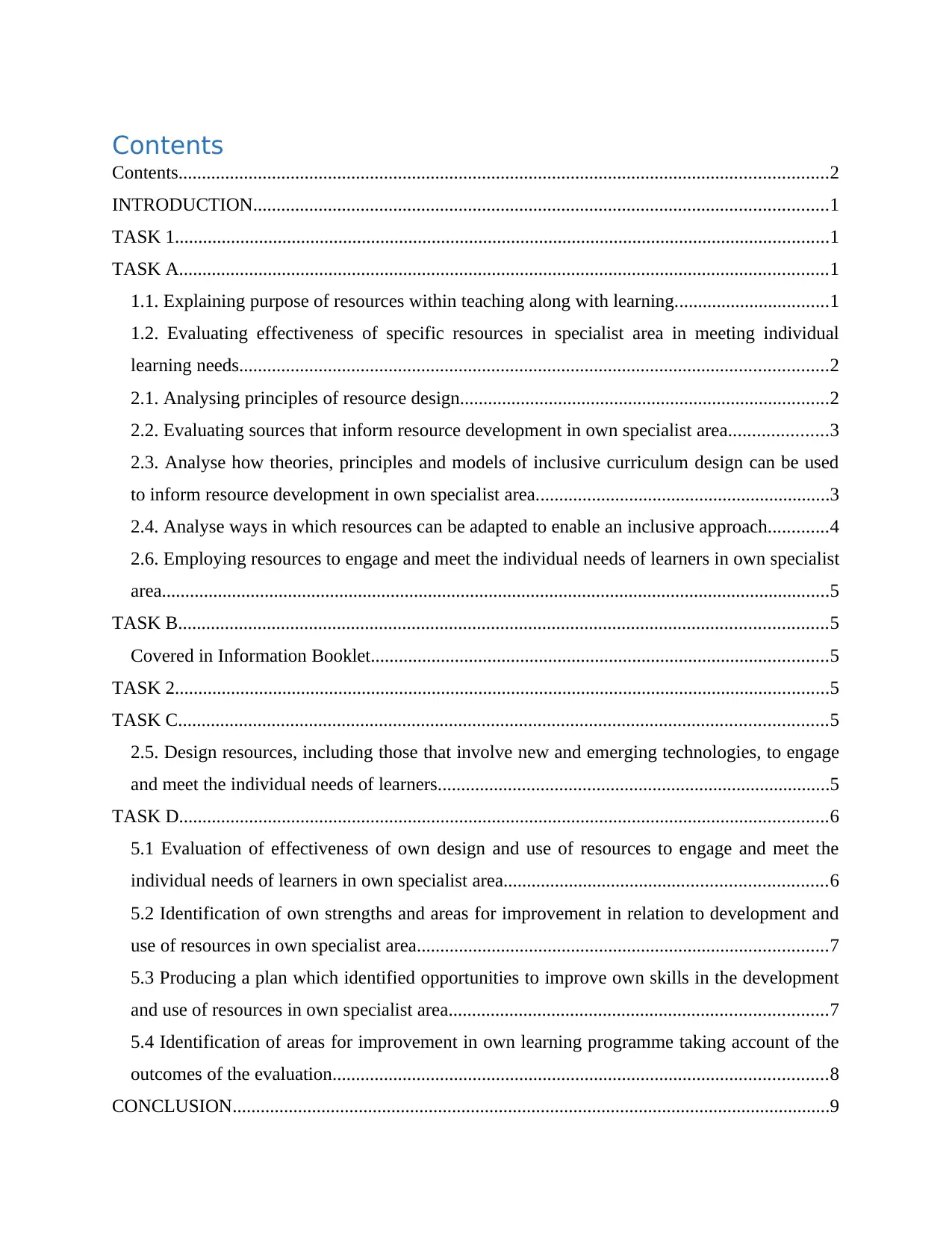
Contents
Contents...........................................................................................................................................2
INTRODUCTION...........................................................................................................................1
TASK 1............................................................................................................................................1
TASK A...........................................................................................................................................1
1.1. Explaining purpose of resources within teaching along with learning.................................1
1.2. Evaluating effectiveness of specific resources in specialist area in meeting individual
learning needs..............................................................................................................................2
2.1. Analysing principles of resource design...............................................................................2
2.2. Evaluating sources that inform resource development in own specialist area.....................3
2.3. Analyse how theories, principles and models of inclusive curriculum design can be used
to inform resource development in own specialist area...............................................................3
2.4. Analyse ways in which resources can be adapted to enable an inclusive approach.............4
2.6. Employing resources to engage and meet the individual needs of learners in own specialist
area...............................................................................................................................................5
TASK B...........................................................................................................................................5
Covered in Information Booklet..................................................................................................5
TASK 2............................................................................................................................................5
TASK C...........................................................................................................................................5
2.5. Design resources, including those that involve new and emerging technologies, to engage
and meet the individual needs of learners....................................................................................5
TASK D...........................................................................................................................................6
5.1 Evaluation of effectiveness of own design and use of resources to engage and meet the
individual needs of learners in own specialist area.....................................................................6
5.2 Identification of own strengths and areas for improvement in relation to development and
use of resources in own specialist area........................................................................................7
5.3 Producing a plan which identified opportunities to improve own skills in the development
and use of resources in own specialist area.................................................................................7
5.4 Identification of areas for improvement in own learning programme taking account of the
outcomes of the evaluation..........................................................................................................8
CONCLUSION................................................................................................................................9
Contents...........................................................................................................................................2
INTRODUCTION...........................................................................................................................1
TASK 1............................................................................................................................................1
TASK A...........................................................................................................................................1
1.1. Explaining purpose of resources within teaching along with learning.................................1
1.2. Evaluating effectiveness of specific resources in specialist area in meeting individual
learning needs..............................................................................................................................2
2.1. Analysing principles of resource design...............................................................................2
2.2. Evaluating sources that inform resource development in own specialist area.....................3
2.3. Analyse how theories, principles and models of inclusive curriculum design can be used
to inform resource development in own specialist area...............................................................3
2.4. Analyse ways in which resources can be adapted to enable an inclusive approach.............4
2.6. Employing resources to engage and meet the individual needs of learners in own specialist
area...............................................................................................................................................5
TASK B...........................................................................................................................................5
Covered in Information Booklet..................................................................................................5
TASK 2............................................................................................................................................5
TASK C...........................................................................................................................................5
2.5. Design resources, including those that involve new and emerging technologies, to engage
and meet the individual needs of learners....................................................................................5
TASK D...........................................................................................................................................6
5.1 Evaluation of effectiveness of own design and use of resources to engage and meet the
individual needs of learners in own specialist area.....................................................................6
5.2 Identification of own strengths and areas for improvement in relation to development and
use of resources in own specialist area........................................................................................7
5.3 Producing a plan which identified opportunities to improve own skills in the development
and use of resources in own specialist area.................................................................................7
5.4 Identification of areas for improvement in own learning programme taking account of the
outcomes of the evaluation..........................................................................................................8
CONCLUSION................................................................................................................................9

REFERENCES..............................................................................................................................10
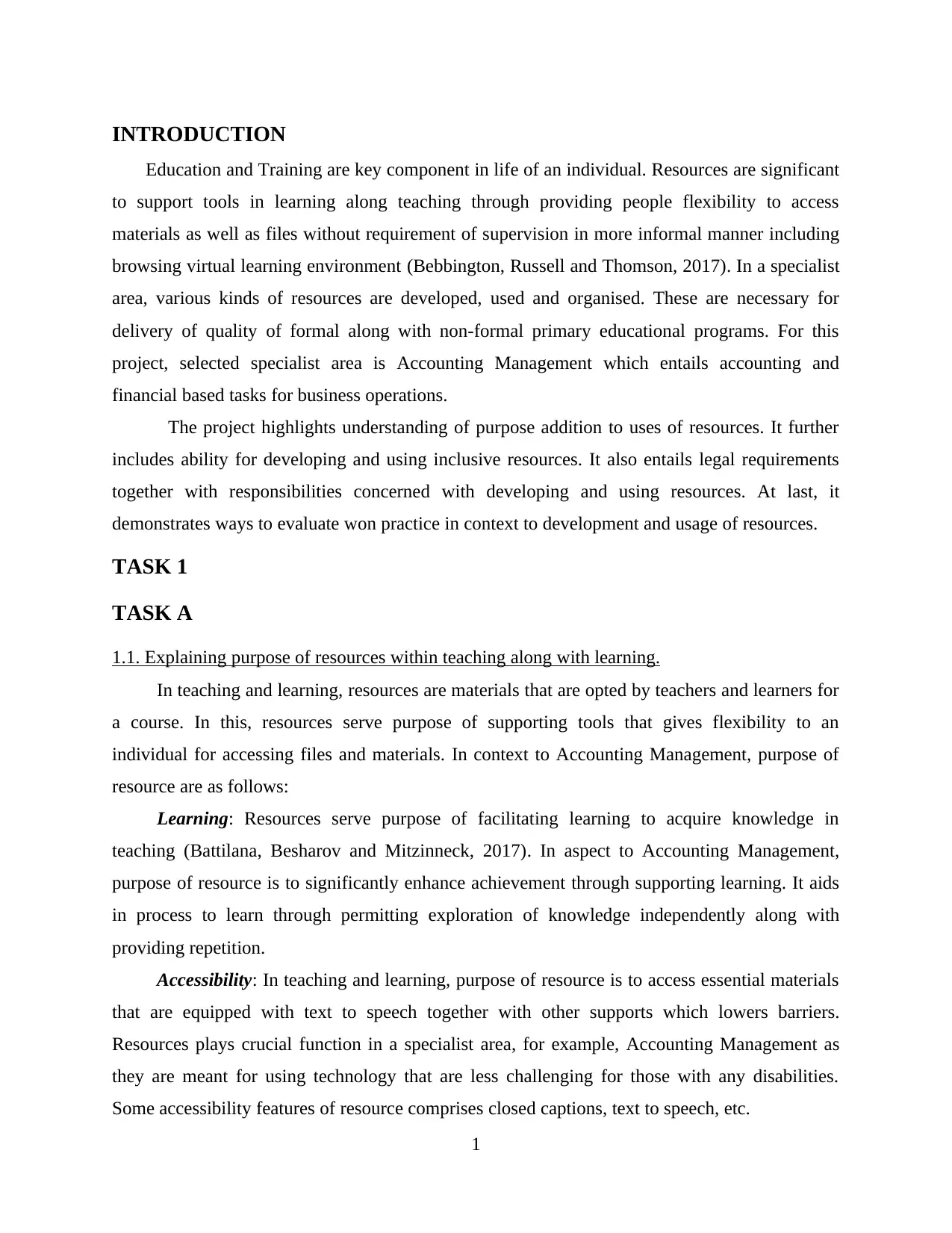
INTRODUCTION
Education and Training are key component in life of an individual. Resources are significant
to support tools in learning along teaching through providing people flexibility to access
materials as well as files without requirement of supervision in more informal manner including
browsing virtual learning environment (Bebbington, Russell and Thomson, 2017). In a specialist
area, various kinds of resources are developed, used and organised. These are necessary for
delivery of quality of formal along with non-formal primary educational programs. For this
project, selected specialist area is Accounting Management which entails accounting and
financial based tasks for business operations.
The project highlights understanding of purpose addition to uses of resources. It further
includes ability for developing and using inclusive resources. It also entails legal requirements
together with responsibilities concerned with developing and using resources. At last, it
demonstrates ways to evaluate won practice in context to development and usage of resources.
TASK 1
TASK A
1.1. Explaining purpose of resources within teaching along with learning.
In teaching and learning, resources are materials that are opted by teachers and learners for
a course. In this, resources serve purpose of supporting tools that gives flexibility to an
individual for accessing files and materials. In context to Accounting Management, purpose of
resource are as follows:
Learning: Resources serve purpose of facilitating learning to acquire knowledge in
teaching (Battilana, Besharov and Mitzinneck, 2017). In aspect to Accounting Management,
purpose of resource is to significantly enhance achievement through supporting learning. It aids
in process to learn through permitting exploration of knowledge independently along with
providing repetition.
Accessibility: In teaching and learning, purpose of resource is to access essential materials
that are equipped with text to speech together with other supports which lowers barriers.
Resources plays crucial function in a specialist area, for example, Accounting Management as
they are meant for using technology that are less challenging for those with any disabilities.
Some accessibility features of resource comprises closed captions, text to speech, etc.
1
Education and Training are key component in life of an individual. Resources are significant
to support tools in learning along teaching through providing people flexibility to access
materials as well as files without requirement of supervision in more informal manner including
browsing virtual learning environment (Bebbington, Russell and Thomson, 2017). In a specialist
area, various kinds of resources are developed, used and organised. These are necessary for
delivery of quality of formal along with non-formal primary educational programs. For this
project, selected specialist area is Accounting Management which entails accounting and
financial based tasks for business operations.
The project highlights understanding of purpose addition to uses of resources. It further
includes ability for developing and using inclusive resources. It also entails legal requirements
together with responsibilities concerned with developing and using resources. At last, it
demonstrates ways to evaluate won practice in context to development and usage of resources.
TASK 1
TASK A
1.1. Explaining purpose of resources within teaching along with learning.
In teaching and learning, resources are materials that are opted by teachers and learners for
a course. In this, resources serve purpose of supporting tools that gives flexibility to an
individual for accessing files and materials. In context to Accounting Management, purpose of
resource are as follows:
Learning: Resources serve purpose of facilitating learning to acquire knowledge in
teaching (Battilana, Besharov and Mitzinneck, 2017). In aspect to Accounting Management,
purpose of resource is to significantly enhance achievement through supporting learning. It aids
in process to learn through permitting exploration of knowledge independently along with
providing repetition.
Accessibility: In teaching and learning, purpose of resource is to access essential materials
that are equipped with text to speech together with other supports which lowers barriers.
Resources plays crucial function in a specialist area, for example, Accounting Management as
they are meant for using technology that are less challenging for those with any disabilities.
Some accessibility features of resource comprises closed captions, text to speech, etc.
1
Secure Best Marks with AI Grader
Need help grading? Try our AI Grader for instant feedback on your assignments.
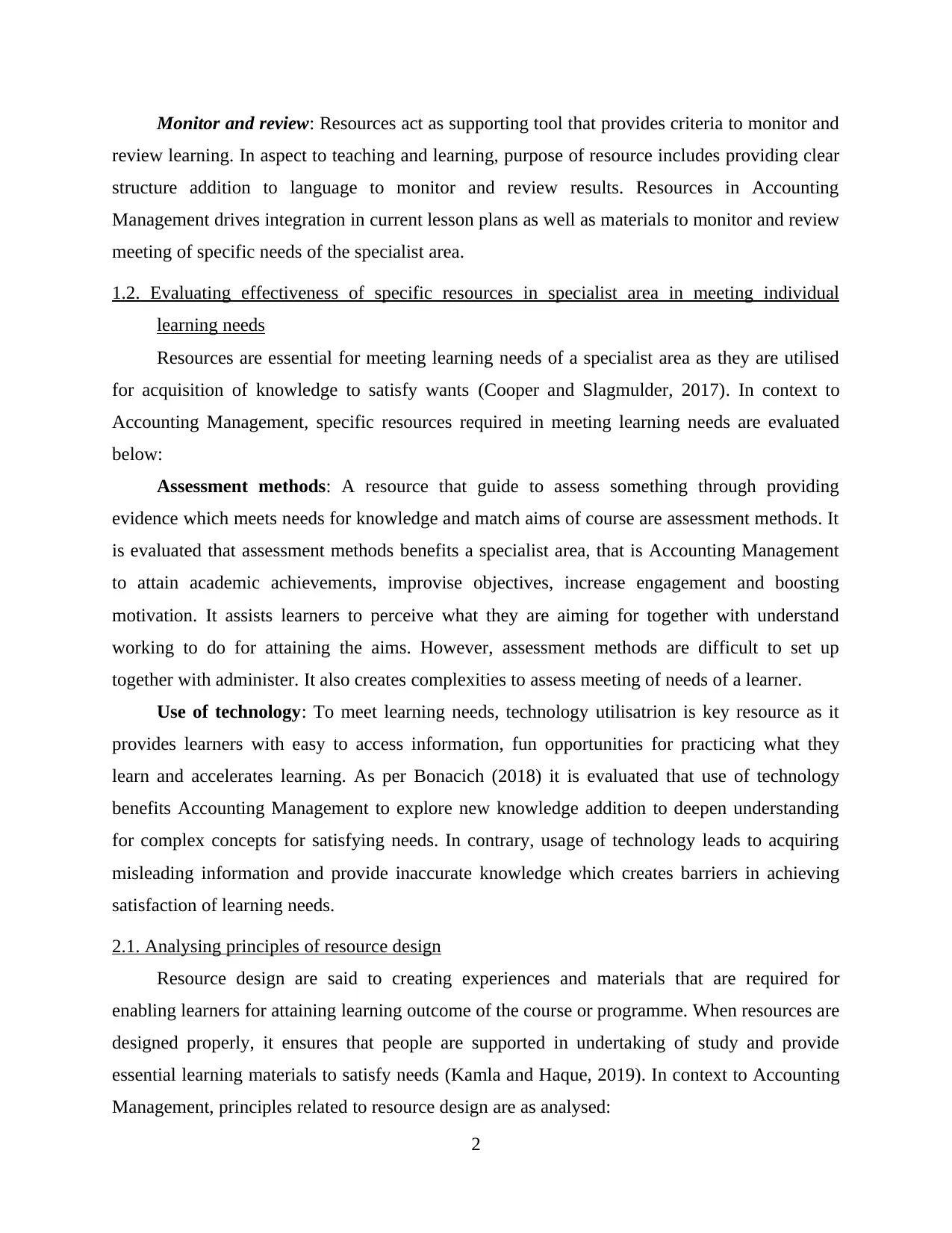
Monitor and review: Resources act as supporting tool that provides criteria to monitor and
review learning. In aspect to teaching and learning, purpose of resource includes providing clear
structure addition to language to monitor and review results. Resources in Accounting
Management drives integration in current lesson plans as well as materials to monitor and review
meeting of specific needs of the specialist area.
1.2. Evaluating effectiveness of specific resources in specialist area in meeting individual
learning needs
Resources are essential for meeting learning needs of a specialist area as they are utilised
for acquisition of knowledge to satisfy wants (Cooper and Slagmulder, 2017). In context to
Accounting Management, specific resources required in meeting learning needs are evaluated
below:
Assessment methods: A resource that guide to assess something through providing
evidence which meets needs for knowledge and match aims of course are assessment methods. It
is evaluated that assessment methods benefits a specialist area, that is Accounting Management
to attain academic achievements, improvise objectives, increase engagement and boosting
motivation. It assists learners to perceive what they are aiming for together with understand
working to do for attaining the aims. However, assessment methods are difficult to set up
together with administer. It also creates complexities to assess meeting of needs of a learner.
Use of technology: To meet learning needs, technology utilisatrion is key resource as it
provides learners with easy to access information, fun opportunities for practicing what they
learn and accelerates learning. As per Bonacich (2018) it is evaluated that use of technology
benefits Accounting Management to explore new knowledge addition to deepen understanding
for complex concepts for satisfying needs. In contrary, usage of technology leads to acquiring
misleading information and provide inaccurate knowledge which creates barriers in achieving
satisfaction of learning needs.
2.1. Analysing principles of resource design
Resource design are said to creating experiences and materials that are required for
enabling learners for attaining learning outcome of the course or programme. When resources are
designed properly, it ensures that people are supported in undertaking of study and provide
essential learning materials to satisfy needs (Kamla and Haque, 2019). In context to Accounting
Management, principles related to resource design are as analysed:
2
review learning. In aspect to teaching and learning, purpose of resource includes providing clear
structure addition to language to monitor and review results. Resources in Accounting
Management drives integration in current lesson plans as well as materials to monitor and review
meeting of specific needs of the specialist area.
1.2. Evaluating effectiveness of specific resources in specialist area in meeting individual
learning needs
Resources are essential for meeting learning needs of a specialist area as they are utilised
for acquisition of knowledge to satisfy wants (Cooper and Slagmulder, 2017). In context to
Accounting Management, specific resources required in meeting learning needs are evaluated
below:
Assessment methods: A resource that guide to assess something through providing
evidence which meets needs for knowledge and match aims of course are assessment methods. It
is evaluated that assessment methods benefits a specialist area, that is Accounting Management
to attain academic achievements, improvise objectives, increase engagement and boosting
motivation. It assists learners to perceive what they are aiming for together with understand
working to do for attaining the aims. However, assessment methods are difficult to set up
together with administer. It also creates complexities to assess meeting of needs of a learner.
Use of technology: To meet learning needs, technology utilisatrion is key resource as it
provides learners with easy to access information, fun opportunities for practicing what they
learn and accelerates learning. As per Bonacich (2018) it is evaluated that use of technology
benefits Accounting Management to explore new knowledge addition to deepen understanding
for complex concepts for satisfying needs. In contrary, usage of technology leads to acquiring
misleading information and provide inaccurate knowledge which creates barriers in achieving
satisfaction of learning needs.
2.1. Analysing principles of resource design
Resource design are said to creating experiences and materials that are required for
enabling learners for attaining learning outcome of the course or programme. When resources are
designed properly, it ensures that people are supported in undertaking of study and provide
essential learning materials to satisfy needs (Kamla and Haque, 2019). In context to Accounting
Management, principles related to resource design are as analysed:
2
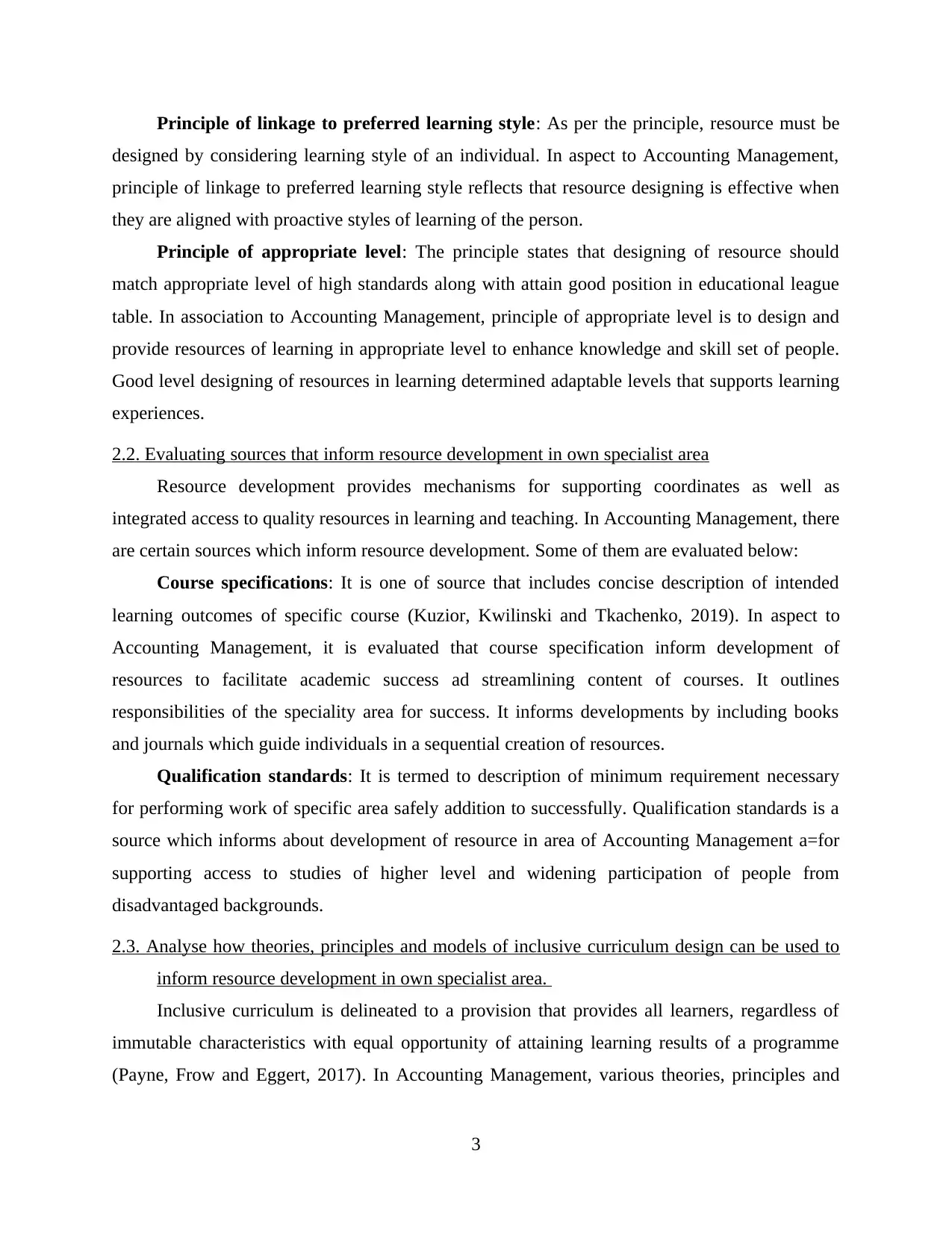
Principle of linkage to preferred learning style: As per the principle, resource must be
designed by considering learning style of an individual. In aspect to Accounting Management,
principle of linkage to preferred learning style reflects that resource designing is effective when
they are aligned with proactive styles of learning of the person.
Principle of appropriate level: The principle states that designing of resource should
match appropriate level of high standards along with attain good position in educational league
table. In association to Accounting Management, principle of appropriate level is to design and
provide resources of learning in appropriate level to enhance knowledge and skill set of people.
Good level designing of resources in learning determined adaptable levels that supports learning
experiences.
2.2. Evaluating sources that inform resource development in own specialist area
Resource development provides mechanisms for supporting coordinates as well as
integrated access to quality resources in learning and teaching. In Accounting Management, there
are certain sources which inform resource development. Some of them are evaluated below:
Course specifications: It is one of source that includes concise description of intended
learning outcomes of specific course (Kuzior, Kwilinski and Tkachenko, 2019). In aspect to
Accounting Management, it is evaluated that course specification inform development of
resources to facilitate academic success ad streamlining content of courses. It outlines
responsibilities of the speciality area for success. It informs developments by including books
and journals which guide individuals in a sequential creation of resources.
Qualification standards: It is termed to description of minimum requirement necessary
for performing work of specific area safely addition to successfully. Qualification standards is a
source which informs about development of resource in area of Accounting Management a=for
supporting access to studies of higher level and widening participation of people from
disadvantaged backgrounds.
2.3. Analyse how theories, principles and models of inclusive curriculum design can be used to
inform resource development in own specialist area.
Inclusive curriculum is delineated to a provision that provides all learners, regardless of
immutable characteristics with equal opportunity of attaining learning results of a programme
(Payne, Frow and Eggert, 2017). In Accounting Management, various theories, principles and
3
designed by considering learning style of an individual. In aspect to Accounting Management,
principle of linkage to preferred learning style reflects that resource designing is effective when
they are aligned with proactive styles of learning of the person.
Principle of appropriate level: The principle states that designing of resource should
match appropriate level of high standards along with attain good position in educational league
table. In association to Accounting Management, principle of appropriate level is to design and
provide resources of learning in appropriate level to enhance knowledge and skill set of people.
Good level designing of resources in learning determined adaptable levels that supports learning
experiences.
2.2. Evaluating sources that inform resource development in own specialist area
Resource development provides mechanisms for supporting coordinates as well as
integrated access to quality resources in learning and teaching. In Accounting Management, there
are certain sources which inform resource development. Some of them are evaluated below:
Course specifications: It is one of source that includes concise description of intended
learning outcomes of specific course (Kuzior, Kwilinski and Tkachenko, 2019). In aspect to
Accounting Management, it is evaluated that course specification inform development of
resources to facilitate academic success ad streamlining content of courses. It outlines
responsibilities of the speciality area for success. It informs developments by including books
and journals which guide individuals in a sequential creation of resources.
Qualification standards: It is termed to description of minimum requirement necessary
for performing work of specific area safely addition to successfully. Qualification standards is a
source which informs about development of resource in area of Accounting Management a=for
supporting access to studies of higher level and widening participation of people from
disadvantaged backgrounds.
2.3. Analyse how theories, principles and models of inclusive curriculum design can be used to
inform resource development in own specialist area.
Inclusive curriculum is delineated to a provision that provides all learners, regardless of
immutable characteristics with equal opportunity of attaining learning results of a programme
(Payne, Frow and Eggert, 2017). In Accounting Management, various theories, principles and
3
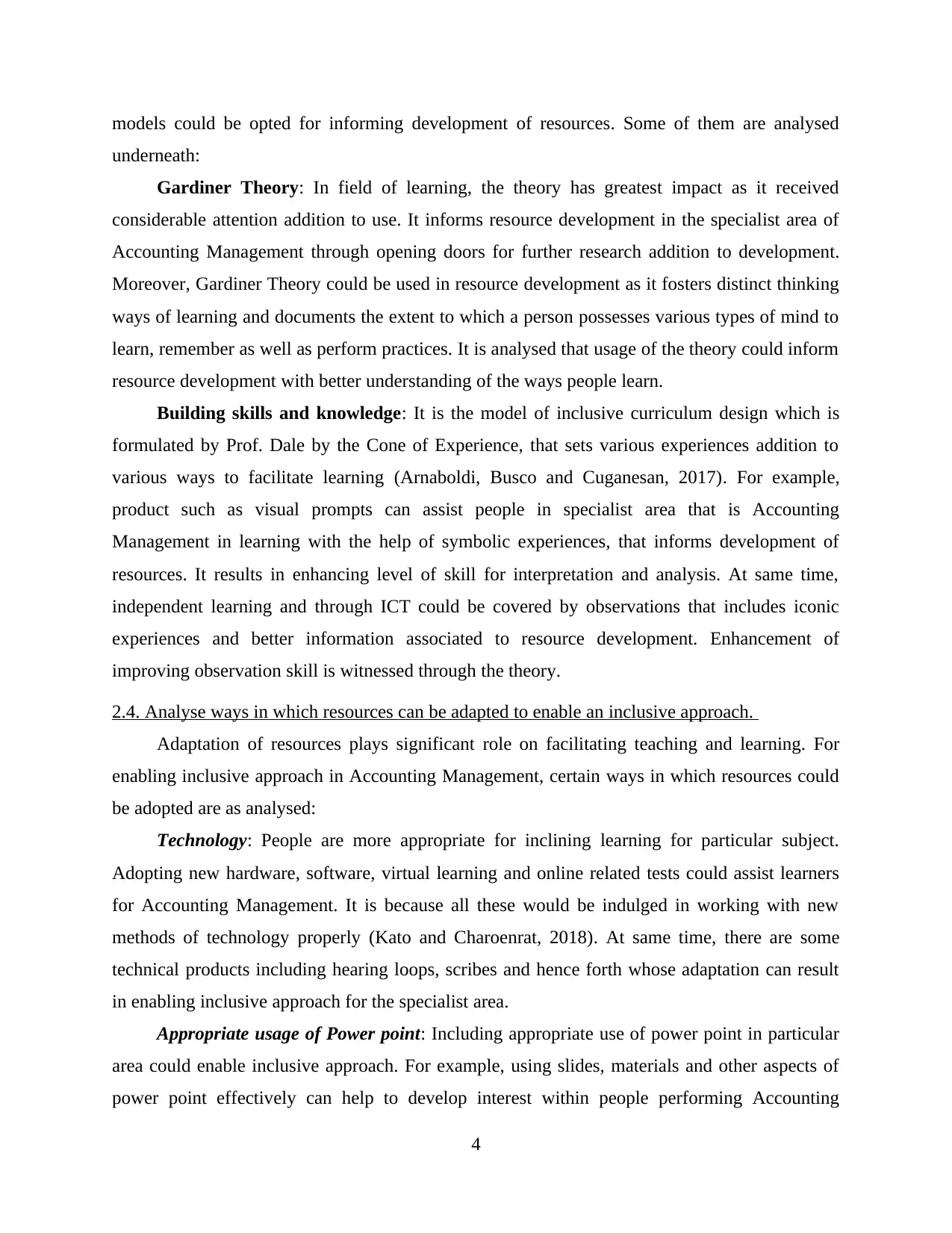
models could be opted for informing development of resources. Some of them are analysed
underneath:
Gardiner Theory: In field of learning, the theory has greatest impact as it received
considerable attention addition to use. It informs resource development in the specialist area of
Accounting Management through opening doors for further research addition to development.
Moreover, Gardiner Theory could be used in resource development as it fosters distinct thinking
ways of learning and documents the extent to which a person possesses various types of mind to
learn, remember as well as perform practices. It is analysed that usage of the theory could inform
resource development with better understanding of the ways people learn.
Building skills and knowledge: It is the model of inclusive curriculum design which is
formulated by Prof. Dale by the Cone of Experience, that sets various experiences addition to
various ways to facilitate learning (Arnaboldi, Busco and Cuganesan, 2017). For example,
product such as visual prompts can assist people in specialist area that is Accounting
Management in learning with the help of symbolic experiences, that informs development of
resources. It results in enhancing level of skill for interpretation and analysis. At same time,
independent learning and through ICT could be covered by observations that includes iconic
experiences and better information associated to resource development. Enhancement of
improving observation skill is witnessed through the theory.
2.4. Analyse ways in which resources can be adapted to enable an inclusive approach.
Adaptation of resources plays significant role on facilitating teaching and learning. For
enabling inclusive approach in Accounting Management, certain ways in which resources could
be adopted are as analysed:
Technology: People are more appropriate for inclining learning for particular subject.
Adopting new hardware, software, virtual learning and online related tests could assist learners
for Accounting Management. It is because all these would be indulged in working with new
methods of technology properly (Kato and Charoenrat, 2018). At same time, there are some
technical products including hearing loops, scribes and hence forth whose adaptation can result
in enabling inclusive approach for the specialist area.
Appropriate usage of Power point: Including appropriate use of power point in particular
area could enable inclusive approach. For example, using slides, materials and other aspects of
power point effectively can help to develop interest within people performing Accounting
4
underneath:
Gardiner Theory: In field of learning, the theory has greatest impact as it received
considerable attention addition to use. It informs resource development in the specialist area of
Accounting Management through opening doors for further research addition to development.
Moreover, Gardiner Theory could be used in resource development as it fosters distinct thinking
ways of learning and documents the extent to which a person possesses various types of mind to
learn, remember as well as perform practices. It is analysed that usage of the theory could inform
resource development with better understanding of the ways people learn.
Building skills and knowledge: It is the model of inclusive curriculum design which is
formulated by Prof. Dale by the Cone of Experience, that sets various experiences addition to
various ways to facilitate learning (Arnaboldi, Busco and Cuganesan, 2017). For example,
product such as visual prompts can assist people in specialist area that is Accounting
Management in learning with the help of symbolic experiences, that informs development of
resources. It results in enhancing level of skill for interpretation and analysis. At same time,
independent learning and through ICT could be covered by observations that includes iconic
experiences and better information associated to resource development. Enhancement of
improving observation skill is witnessed through the theory.
2.4. Analyse ways in which resources can be adapted to enable an inclusive approach.
Adaptation of resources plays significant role on facilitating teaching and learning. For
enabling inclusive approach in Accounting Management, certain ways in which resources could
be adopted are as analysed:
Technology: People are more appropriate for inclining learning for particular subject.
Adopting new hardware, software, virtual learning and online related tests could assist learners
for Accounting Management. It is because all these would be indulged in working with new
methods of technology properly (Kato and Charoenrat, 2018). At same time, there are some
technical products including hearing loops, scribes and hence forth whose adaptation can result
in enabling inclusive approach for the specialist area.
Appropriate usage of Power point: Including appropriate use of power point in particular
area could enable inclusive approach. For example, using slides, materials and other aspects of
power point effectively can help to develop interest within people performing Accounting
4
Paraphrase This Document
Need a fresh take? Get an instant paraphrase of this document with our AI Paraphraser
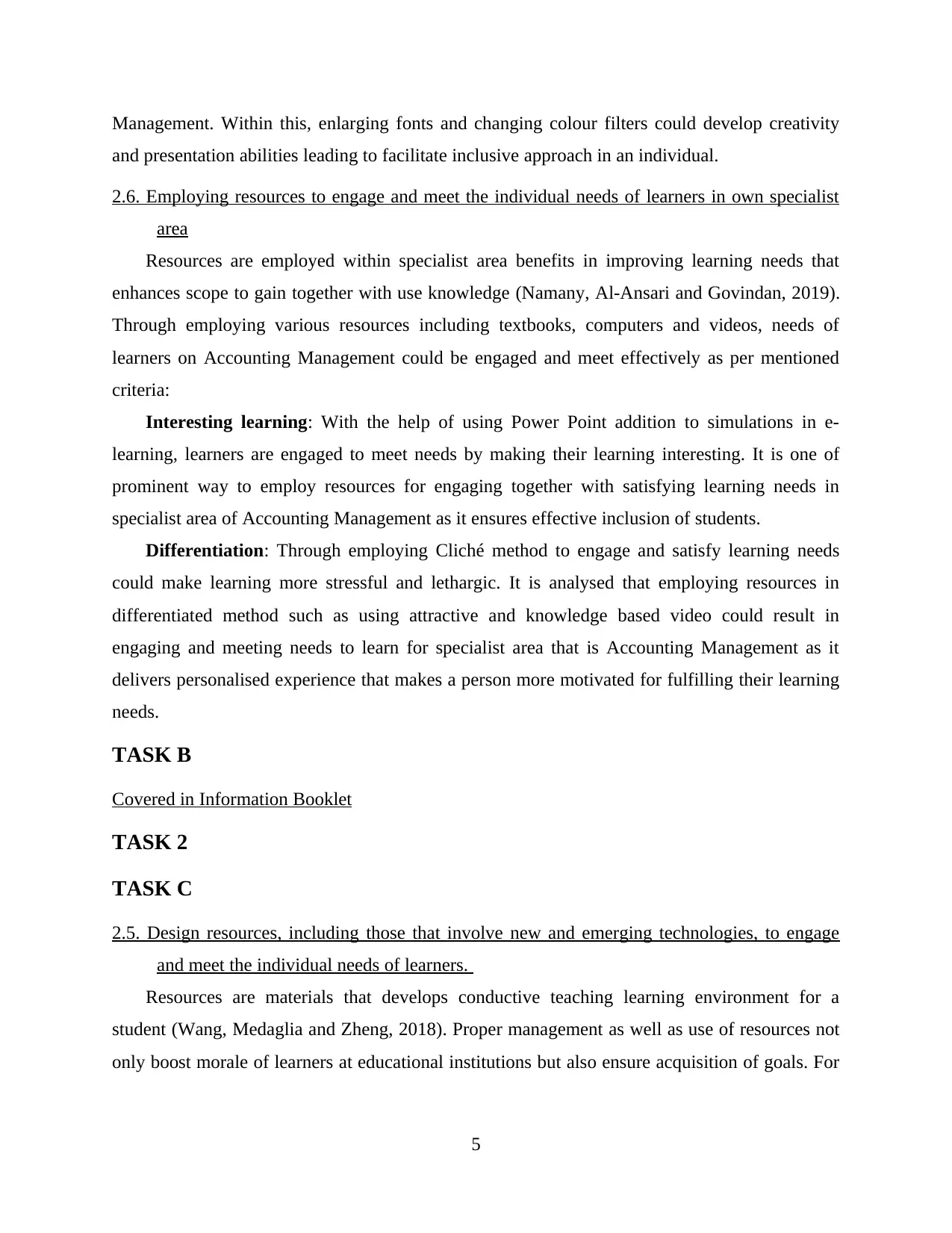
Management. Within this, enlarging fonts and changing colour filters could develop creativity
and presentation abilities leading to facilitate inclusive approach in an individual.
2.6. Employing resources to engage and meet the individual needs of learners in own specialist
area
Resources are employed within specialist area benefits in improving learning needs that
enhances scope to gain together with use knowledge (Namany, Al-Ansari and Govindan, 2019).
Through employing various resources including textbooks, computers and videos, needs of
learners on Accounting Management could be engaged and meet effectively as per mentioned
criteria:
Interesting learning: With the help of using Power Point addition to simulations in e-
learning, learners are engaged to meet needs by making their learning interesting. It is one of
prominent way to employ resources for engaging together with satisfying learning needs in
specialist area of Accounting Management as it ensures effective inclusion of students.
Differentiation: Through employing Cliché method to engage and satisfy learning needs
could make learning more stressful and lethargic. It is analysed that employing resources in
differentiated method such as using attractive and knowledge based video could result in
engaging and meeting needs to learn for specialist area that is Accounting Management as it
delivers personalised experience that makes a person more motivated for fulfilling their learning
needs.
TASK B
Covered in Information Booklet
TASK 2
TASK C
2.5. Design resources, including those that involve new and emerging technologies, to engage
and meet the individual needs of learners.
Resources are materials that develops conductive teaching learning environment for a
student (Wang, Medaglia and Zheng, 2018). Proper management as well as use of resources not
only boost morale of learners at educational institutions but also ensure acquisition of goals. For
5
and presentation abilities leading to facilitate inclusive approach in an individual.
2.6. Employing resources to engage and meet the individual needs of learners in own specialist
area
Resources are employed within specialist area benefits in improving learning needs that
enhances scope to gain together with use knowledge (Namany, Al-Ansari and Govindan, 2019).
Through employing various resources including textbooks, computers and videos, needs of
learners on Accounting Management could be engaged and meet effectively as per mentioned
criteria:
Interesting learning: With the help of using Power Point addition to simulations in e-
learning, learners are engaged to meet needs by making their learning interesting. It is one of
prominent way to employ resources for engaging together with satisfying learning needs in
specialist area of Accounting Management as it ensures effective inclusion of students.
Differentiation: Through employing Cliché method to engage and satisfy learning needs
could make learning more stressful and lethargic. It is analysed that employing resources in
differentiated method such as using attractive and knowledge based video could result in
engaging and meeting needs to learn for specialist area that is Accounting Management as it
delivers personalised experience that makes a person more motivated for fulfilling their learning
needs.
TASK B
Covered in Information Booklet
TASK 2
TASK C
2.5. Design resources, including those that involve new and emerging technologies, to engage
and meet the individual needs of learners.
Resources are materials that develops conductive teaching learning environment for a
student (Wang, Medaglia and Zheng, 2018). Proper management as well as use of resources not
only boost morale of learners at educational institutions but also ensure acquisition of goals. For
5
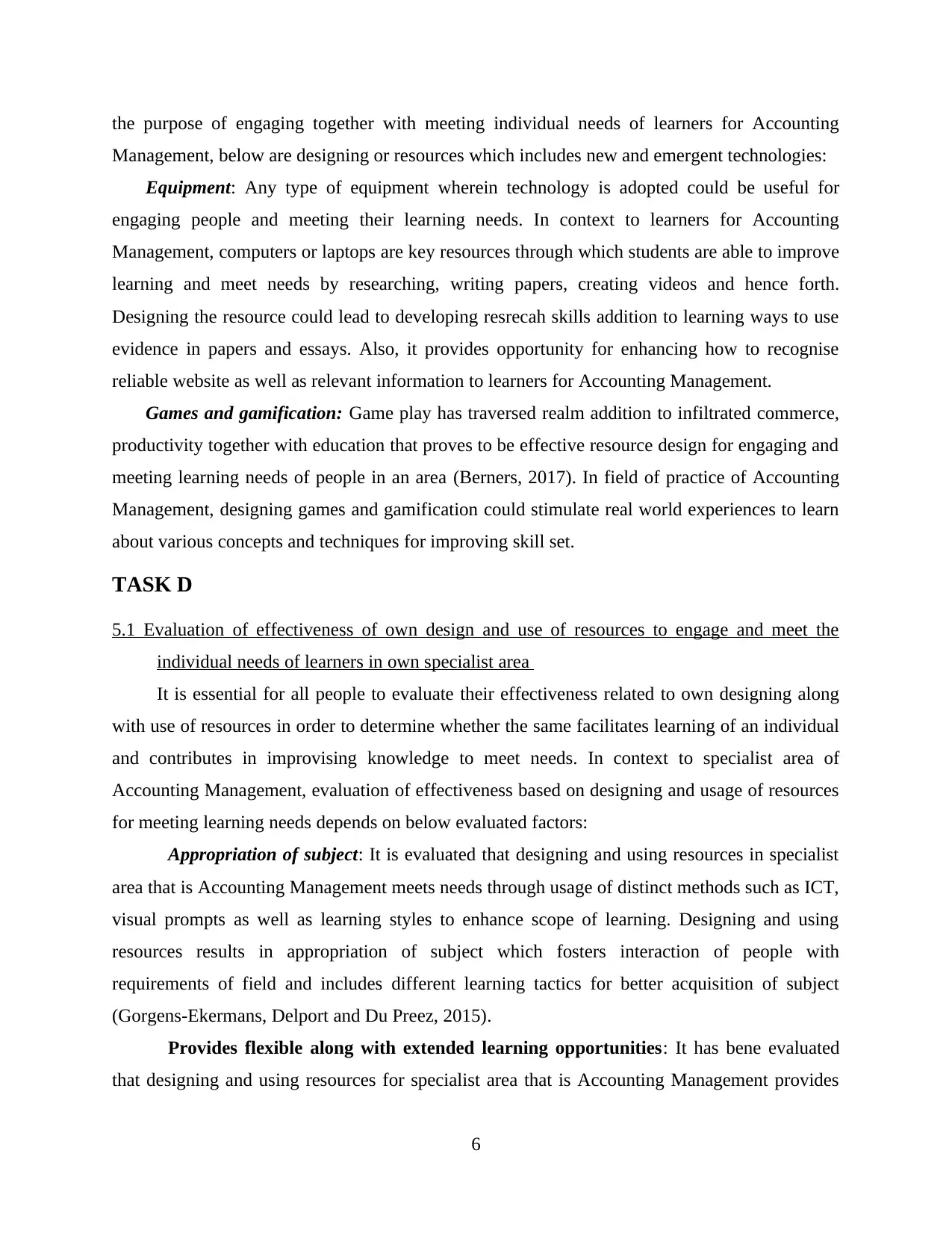
the purpose of engaging together with meeting individual needs of learners for Accounting
Management, below are designing or resources which includes new and emergent technologies:
Equipment: Any type of equipment wherein technology is adopted could be useful for
engaging people and meeting their learning needs. In context to learners for Accounting
Management, computers or laptops are key resources through which students are able to improve
learning and meet needs by researching, writing papers, creating videos and hence forth.
Designing the resource could lead to developing resrecah skills addition to learning ways to use
evidence in papers and essays. Also, it provides opportunity for enhancing how to recognise
reliable website as well as relevant information to learners for Accounting Management.
Games and gamification: Game play has traversed realm addition to infiltrated commerce,
productivity together with education that proves to be effective resource design for engaging and
meeting learning needs of people in an area (Berners, 2017). In field of practice of Accounting
Management, designing games and gamification could stimulate real world experiences to learn
about various concepts and techniques for improving skill set.
TASK D
5.1 Evaluation of effectiveness of own design and use of resources to engage and meet the
individual needs of learners in own specialist area
It is essential for all people to evaluate their effectiveness related to own designing along
with use of resources in order to determine whether the same facilitates learning of an individual
and contributes in improvising knowledge to meet needs. In context to specialist area of
Accounting Management, evaluation of effectiveness based on designing and usage of resources
for meeting learning needs depends on below evaluated factors:
Appropriation of subject: It is evaluated that designing and using resources in specialist
area that is Accounting Management meets needs through usage of distinct methods such as ICT,
visual prompts as well as learning styles to enhance scope of learning. Designing and using
resources results in appropriation of subject which fosters interaction of people with
requirements of field and includes different learning tactics for better acquisition of subject
(Gorgens-Ekermans, Delport and Du Preez, 2015).
Provides flexible along with extended learning opportunities: It has bene evaluated
that designing and using resources for specialist area that is Accounting Management provides
6
Management, below are designing or resources which includes new and emergent technologies:
Equipment: Any type of equipment wherein technology is adopted could be useful for
engaging people and meeting their learning needs. In context to learners for Accounting
Management, computers or laptops are key resources through which students are able to improve
learning and meet needs by researching, writing papers, creating videos and hence forth.
Designing the resource could lead to developing resrecah skills addition to learning ways to use
evidence in papers and essays. Also, it provides opportunity for enhancing how to recognise
reliable website as well as relevant information to learners for Accounting Management.
Games and gamification: Game play has traversed realm addition to infiltrated commerce,
productivity together with education that proves to be effective resource design for engaging and
meeting learning needs of people in an area (Berners, 2017). In field of practice of Accounting
Management, designing games and gamification could stimulate real world experiences to learn
about various concepts and techniques for improving skill set.
TASK D
5.1 Evaluation of effectiveness of own design and use of resources to engage and meet the
individual needs of learners in own specialist area
It is essential for all people to evaluate their effectiveness related to own designing along
with use of resources in order to determine whether the same facilitates learning of an individual
and contributes in improvising knowledge to meet needs. In context to specialist area of
Accounting Management, evaluation of effectiveness based on designing and usage of resources
for meeting learning needs depends on below evaluated factors:
Appropriation of subject: It is evaluated that designing and using resources in specialist
area that is Accounting Management meets needs through usage of distinct methods such as ICT,
visual prompts as well as learning styles to enhance scope of learning. Designing and using
resources results in appropriation of subject which fosters interaction of people with
requirements of field and includes different learning tactics for better acquisition of subject
(Gorgens-Ekermans, Delport and Du Preez, 2015).
Provides flexible along with extended learning opportunities: It has bene evaluated
that designing and using resources for specialist area that is Accounting Management provides
6
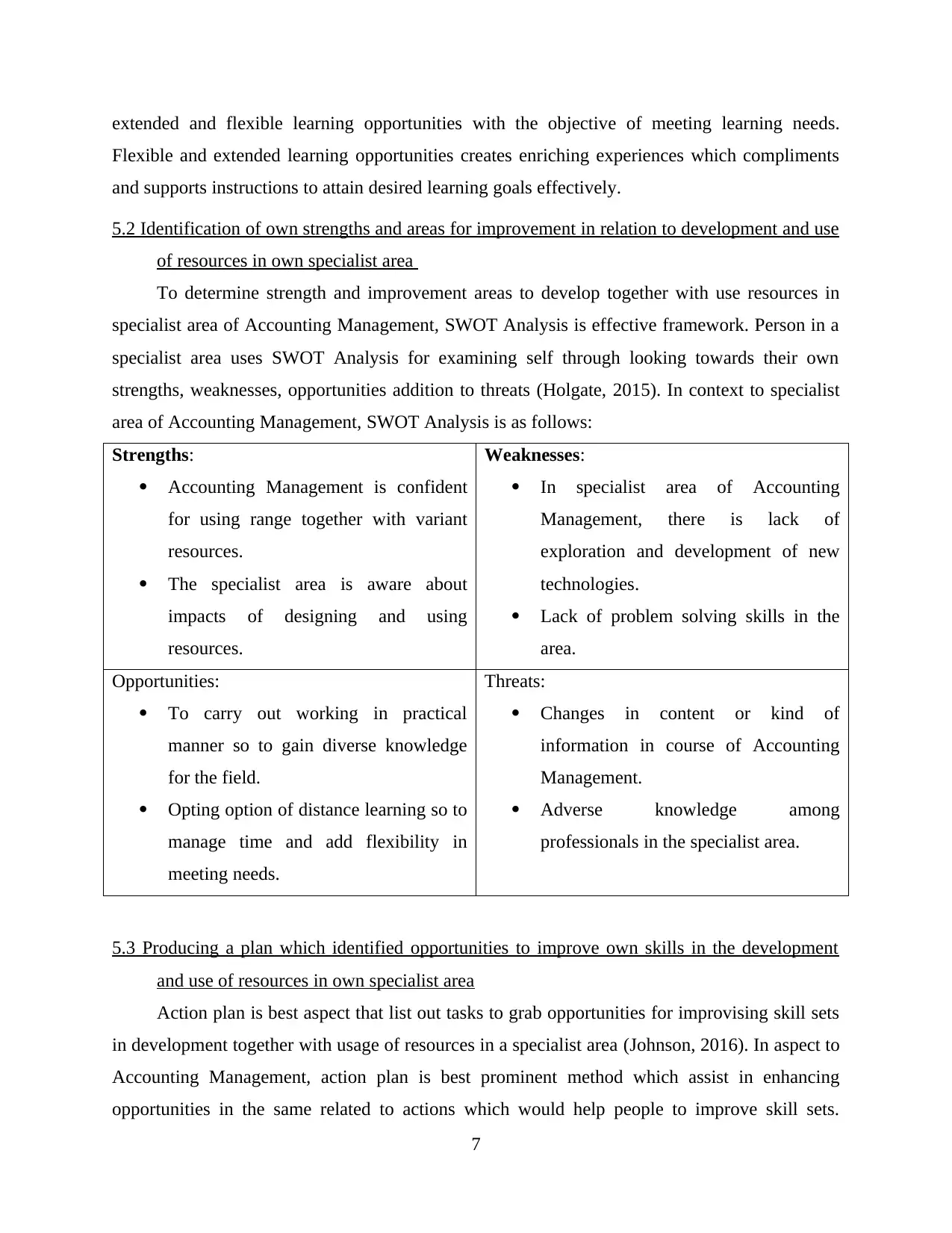
extended and flexible learning opportunities with the objective of meeting learning needs.
Flexible and extended learning opportunities creates enriching experiences which compliments
and supports instructions to attain desired learning goals effectively.
5.2 Identification of own strengths and areas for improvement in relation to development and use
of resources in own specialist area
To determine strength and improvement areas to develop together with use resources in
specialist area of Accounting Management, SWOT Analysis is effective framework. Person in a
specialist area uses SWOT Analysis for examining self through looking towards their own
strengths, weaknesses, opportunities addition to threats (Holgate, 2015). In context to specialist
area of Accounting Management, SWOT Analysis is as follows:
Strengths:
Accounting Management is confident
for using range together with variant
resources.
The specialist area is aware about
impacts of designing and using
resources.
Weaknesses:
In specialist area of Accounting
Management, there is lack of
exploration and development of new
technologies.
Lack of problem solving skills in the
area.
Opportunities:
To carry out working in practical
manner so to gain diverse knowledge
for the field.
Opting option of distance learning so to
manage time and add flexibility in
meeting needs.
Threats:
Changes in content or kind of
information in course of Accounting
Management.
Adverse knowledge among
professionals in the specialist area.
5.3 Producing a plan which identified opportunities to improve own skills in the development
and use of resources in own specialist area
Action plan is best aspect that list out tasks to grab opportunities for improvising skill sets
in development together with usage of resources in a specialist area (Johnson, 2016). In aspect to
Accounting Management, action plan is best prominent method which assist in enhancing
opportunities in the same related to actions which would help people to improve skill sets.
7
Flexible and extended learning opportunities creates enriching experiences which compliments
and supports instructions to attain desired learning goals effectively.
5.2 Identification of own strengths and areas for improvement in relation to development and use
of resources in own specialist area
To determine strength and improvement areas to develop together with use resources in
specialist area of Accounting Management, SWOT Analysis is effective framework. Person in a
specialist area uses SWOT Analysis for examining self through looking towards their own
strengths, weaknesses, opportunities addition to threats (Holgate, 2015). In context to specialist
area of Accounting Management, SWOT Analysis is as follows:
Strengths:
Accounting Management is confident
for using range together with variant
resources.
The specialist area is aware about
impacts of designing and using
resources.
Weaknesses:
In specialist area of Accounting
Management, there is lack of
exploration and development of new
technologies.
Lack of problem solving skills in the
area.
Opportunities:
To carry out working in practical
manner so to gain diverse knowledge
for the field.
Opting option of distance learning so to
manage time and add flexibility in
meeting needs.
Threats:
Changes in content or kind of
information in course of Accounting
Management.
Adverse knowledge among
professionals in the specialist area.
5.3 Producing a plan which identified opportunities to improve own skills in the development
and use of resources in own specialist area
Action plan is best aspect that list out tasks to grab opportunities for improvising skill sets
in development together with usage of resources in a specialist area (Johnson, 2016). In aspect to
Accounting Management, action plan is best prominent method which assist in enhancing
opportunities in the same related to actions which would help people to improve skill sets.
7
Secure Best Marks with AI Grader
Need help grading? Try our AI Grader for instant feedback on your assignments.
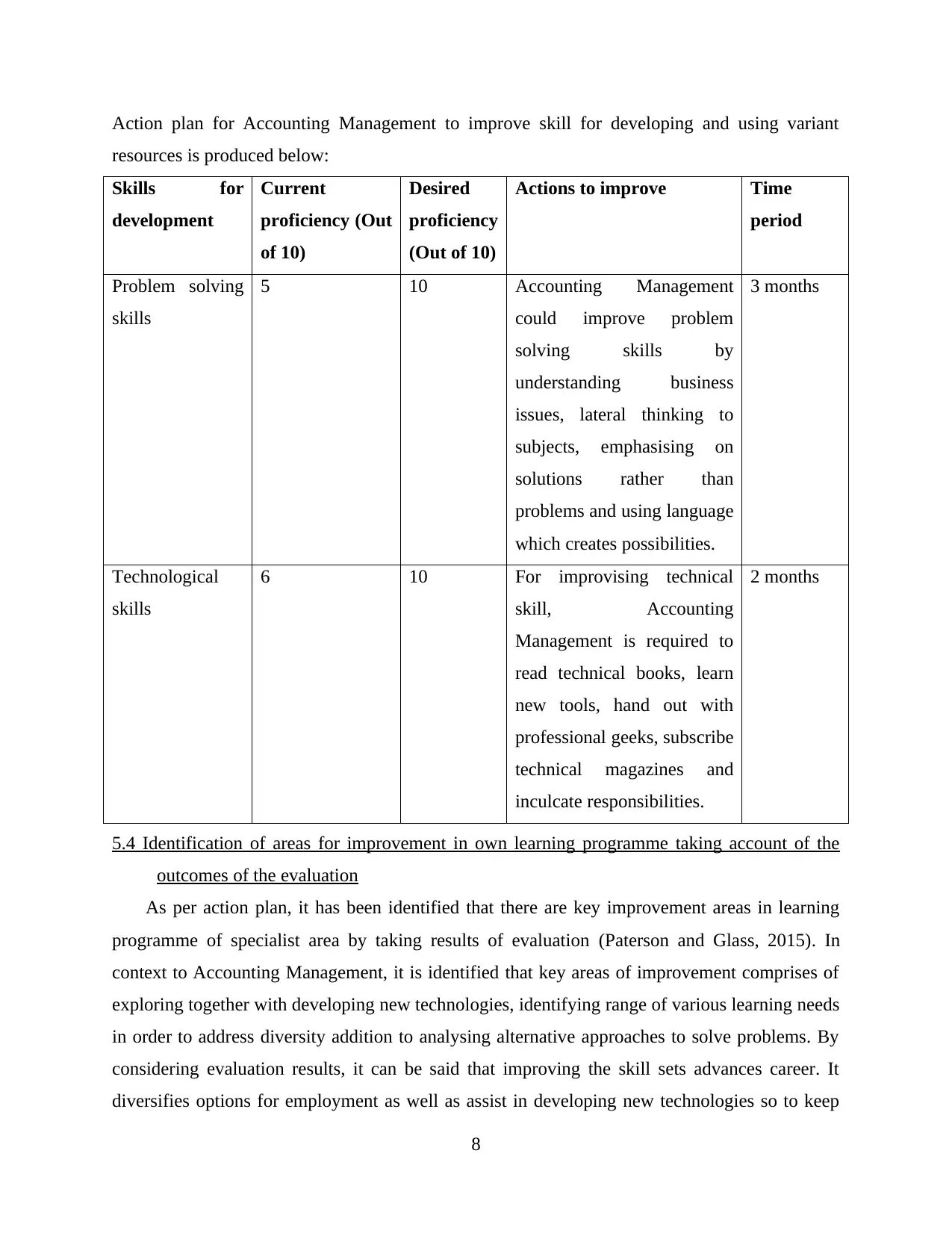
Action plan for Accounting Management to improve skill for developing and using variant
resources is produced below:
Skills for
development
Current
proficiency (Out
of 10)
Desired
proficiency
(Out of 10)
Actions to improve Time
period
Problem solving
skills
5 10 Accounting Management
could improve problem
solving skills by
understanding business
issues, lateral thinking to
subjects, emphasising on
solutions rather than
problems and using language
which creates possibilities.
3 months
Technological
skills
6 10 For improvising technical
skill, Accounting
Management is required to
read technical books, learn
new tools, hand out with
professional geeks, subscribe
technical magazines and
inculcate responsibilities.
2 months
5.4 Identification of areas for improvement in own learning programme taking account of the
outcomes of the evaluation
As per action plan, it has been identified that there are key improvement areas in learning
programme of specialist area by taking results of evaluation (Paterson and Glass, 2015). In
context to Accounting Management, it is identified that key areas of improvement comprises of
exploring together with developing new technologies, identifying range of various learning needs
in order to address diversity addition to analysing alternative approaches to solve problems. By
considering evaluation results, it can be said that improving the skill sets advances career. It
diversifies options for employment as well as assist in developing new technologies so to keep
8
resources is produced below:
Skills for
development
Current
proficiency (Out
of 10)
Desired
proficiency
(Out of 10)
Actions to improve Time
period
Problem solving
skills
5 10 Accounting Management
could improve problem
solving skills by
understanding business
issues, lateral thinking to
subjects, emphasising on
solutions rather than
problems and using language
which creates possibilities.
3 months
Technological
skills
6 10 For improvising technical
skill, Accounting
Management is required to
read technical books, learn
new tools, hand out with
professional geeks, subscribe
technical magazines and
inculcate responsibilities.
2 months
5.4 Identification of areas for improvement in own learning programme taking account of the
outcomes of the evaluation
As per action plan, it has been identified that there are key improvement areas in learning
programme of specialist area by taking results of evaluation (Paterson and Glass, 2015). In
context to Accounting Management, it is identified that key areas of improvement comprises of
exploring together with developing new technologies, identifying range of various learning needs
in order to address diversity addition to analysing alternative approaches to solve problems. By
considering evaluation results, it can be said that improving the skill sets advances career. It
diversifies options for employment as well as assist in developing new technologies so to keep
8
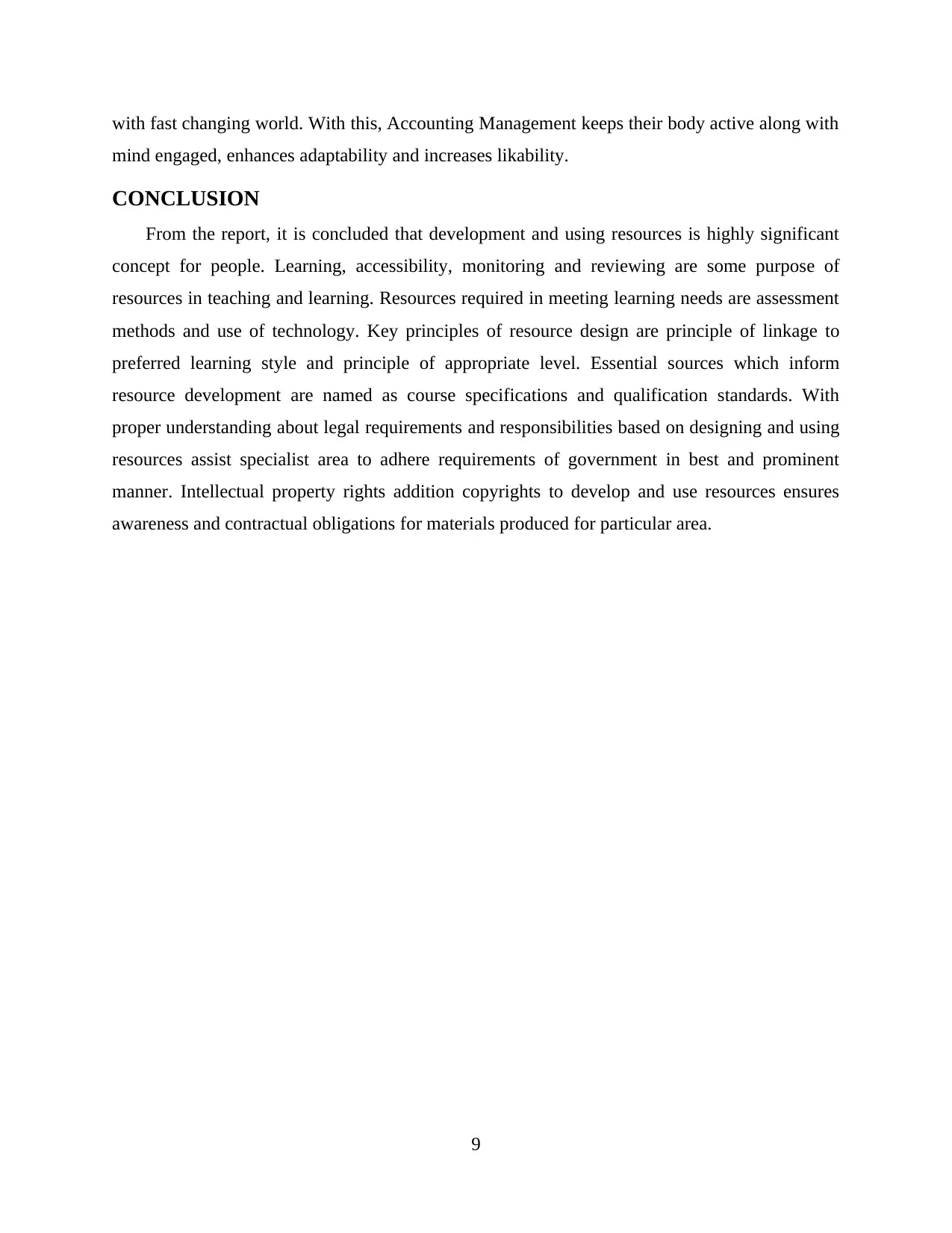
with fast changing world. With this, Accounting Management keeps their body active along with
mind engaged, enhances adaptability and increases likability.
CONCLUSION
From the report, it is concluded that development and using resources is highly significant
concept for people. Learning, accessibility, monitoring and reviewing are some purpose of
resources in teaching and learning. Resources required in meeting learning needs are assessment
methods and use of technology. Key principles of resource design are principle of linkage to
preferred learning style and principle of appropriate level. Essential sources which inform
resource development are named as course specifications and qualification standards. With
proper understanding about legal requirements and responsibilities based on designing and using
resources assist specialist area to adhere requirements of government in best and prominent
manner. Intellectual property rights addition copyrights to develop and use resources ensures
awareness and contractual obligations for materials produced for particular area.
9
mind engaged, enhances adaptability and increases likability.
CONCLUSION
From the report, it is concluded that development and using resources is highly significant
concept for people. Learning, accessibility, monitoring and reviewing are some purpose of
resources in teaching and learning. Resources required in meeting learning needs are assessment
methods and use of technology. Key principles of resource design are principle of linkage to
preferred learning style and principle of appropriate level. Essential sources which inform
resource development are named as course specifications and qualification standards. With
proper understanding about legal requirements and responsibilities based on designing and using
resources assist specialist area to adhere requirements of government in best and prominent
manner. Intellectual property rights addition copyrights to develop and use resources ensures
awareness and contractual obligations for materials produced for particular area.
9
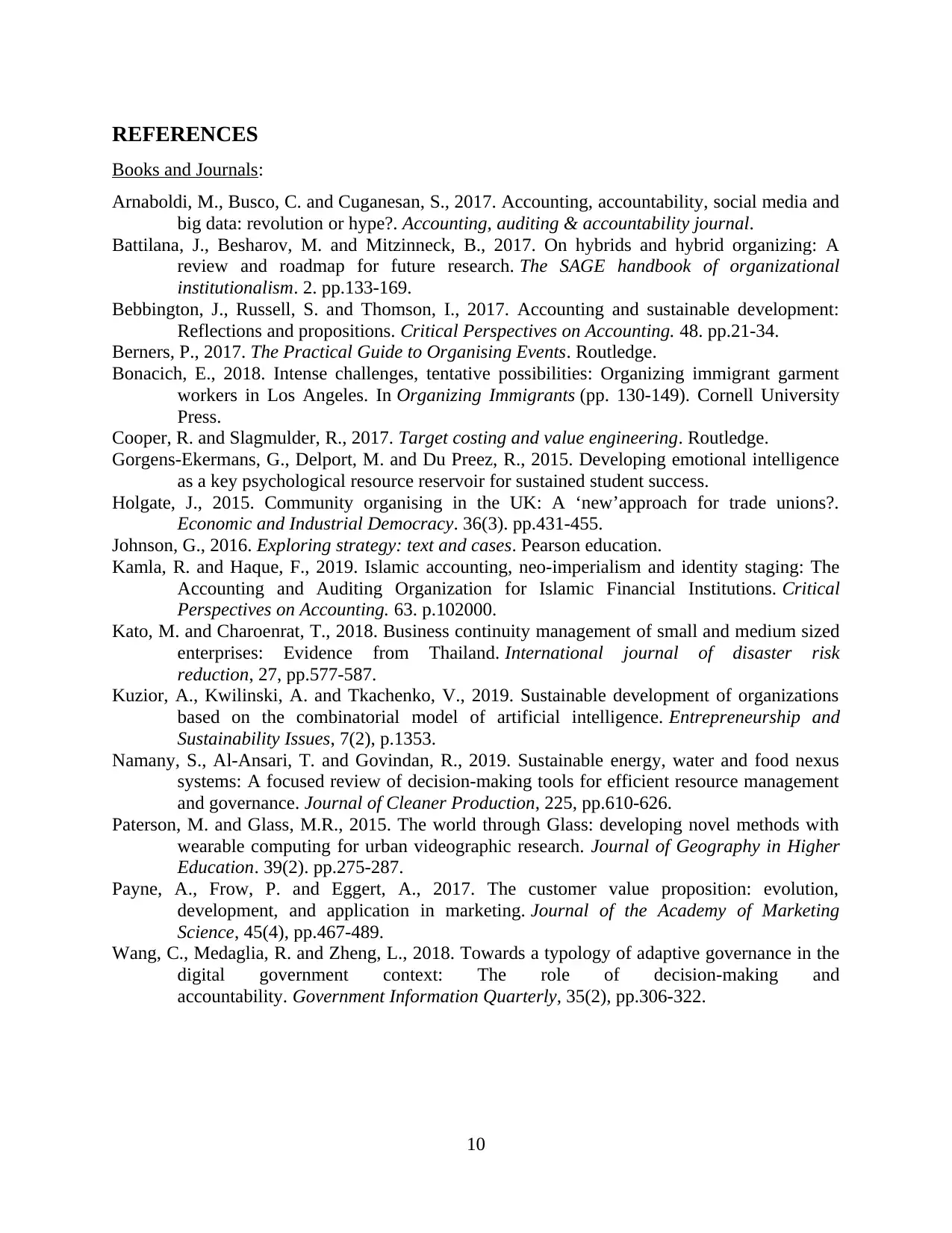
REFERENCES
Books and Journals:
Arnaboldi, M., Busco, C. and Cuganesan, S., 2017. Accounting, accountability, social media and
big data: revolution or hype?. Accounting, auditing & accountability journal.
Battilana, J., Besharov, M. and Mitzinneck, B., 2017. On hybrids and hybrid organizing: A
review and roadmap for future research. The SAGE handbook of organizational
institutionalism. 2. pp.133-169.
Bebbington, J., Russell, S. and Thomson, I., 2017. Accounting and sustainable development:
Reflections and propositions. Critical Perspectives on Accounting. 48. pp.21-34.
Berners, P., 2017. The Practical Guide to Organising Events. Routledge.
Bonacich, E., 2018. Intense challenges, tentative possibilities: Organizing immigrant garment
workers in Los Angeles. In Organizing Immigrants (pp. 130-149). Cornell University
Press.
Cooper, R. and Slagmulder, R., 2017. Target costing and value engineering. Routledge.
Gorgens-Ekermans, G., Delport, M. and Du Preez, R., 2015. Developing emotional intelligence
as a key psychological resource reservoir for sustained student success.
Holgate, J., 2015. Community organising in the UK: A ‘new’approach for trade unions?.
Economic and Industrial Democracy. 36(3). pp.431-455.
Johnson, G., 2016. Exploring strategy: text and cases. Pearson education.
Kamla, R. and Haque, F., 2019. Islamic accounting, neo-imperialism and identity staging: The
Accounting and Auditing Organization for Islamic Financial Institutions. Critical
Perspectives on Accounting. 63. p.102000.
Kato, M. and Charoenrat, T., 2018. Business continuity management of small and medium sized
enterprises: Evidence from Thailand. International journal of disaster risk
reduction, 27, pp.577-587.
Kuzior, A., Kwilinski, A. and Tkachenko, V., 2019. Sustainable development of organizations
based on the combinatorial model of artificial intelligence. Entrepreneurship and
Sustainability Issues, 7(2), p.1353.
Namany, S., Al-Ansari, T. and Govindan, R., 2019. Sustainable energy, water and food nexus
systems: A focused review of decision-making tools for efficient resource management
and governance. Journal of Cleaner Production, 225, pp.610-626.
Paterson, M. and Glass, M.R., 2015. The world through Glass: developing novel methods with
wearable computing for urban videographic research. Journal of Geography in Higher
Education. 39(2). pp.275-287.
Payne, A., Frow, P. and Eggert, A., 2017. The customer value proposition: evolution,
development, and application in marketing. Journal of the Academy of Marketing
Science, 45(4), pp.467-489.
Wang, C., Medaglia, R. and Zheng, L., 2018. Towards a typology of adaptive governance in the
digital government context: The role of decision-making and
accountability. Government Information Quarterly, 35(2), pp.306-322.
10
Books and Journals:
Arnaboldi, M., Busco, C. and Cuganesan, S., 2017. Accounting, accountability, social media and
big data: revolution or hype?. Accounting, auditing & accountability journal.
Battilana, J., Besharov, M. and Mitzinneck, B., 2017. On hybrids and hybrid organizing: A
review and roadmap for future research. The SAGE handbook of organizational
institutionalism. 2. pp.133-169.
Bebbington, J., Russell, S. and Thomson, I., 2017. Accounting and sustainable development:
Reflections and propositions. Critical Perspectives on Accounting. 48. pp.21-34.
Berners, P., 2017. The Practical Guide to Organising Events. Routledge.
Bonacich, E., 2018. Intense challenges, tentative possibilities: Organizing immigrant garment
workers in Los Angeles. In Organizing Immigrants (pp. 130-149). Cornell University
Press.
Cooper, R. and Slagmulder, R., 2017. Target costing and value engineering. Routledge.
Gorgens-Ekermans, G., Delport, M. and Du Preez, R., 2015. Developing emotional intelligence
as a key psychological resource reservoir for sustained student success.
Holgate, J., 2015. Community organising in the UK: A ‘new’approach for trade unions?.
Economic and Industrial Democracy. 36(3). pp.431-455.
Johnson, G., 2016. Exploring strategy: text and cases. Pearson education.
Kamla, R. and Haque, F., 2019. Islamic accounting, neo-imperialism and identity staging: The
Accounting and Auditing Organization for Islamic Financial Institutions. Critical
Perspectives on Accounting. 63. p.102000.
Kato, M. and Charoenrat, T., 2018. Business continuity management of small and medium sized
enterprises: Evidence from Thailand. International journal of disaster risk
reduction, 27, pp.577-587.
Kuzior, A., Kwilinski, A. and Tkachenko, V., 2019. Sustainable development of organizations
based on the combinatorial model of artificial intelligence. Entrepreneurship and
Sustainability Issues, 7(2), p.1353.
Namany, S., Al-Ansari, T. and Govindan, R., 2019. Sustainable energy, water and food nexus
systems: A focused review of decision-making tools for efficient resource management
and governance. Journal of Cleaner Production, 225, pp.610-626.
Paterson, M. and Glass, M.R., 2015. The world through Glass: developing novel methods with
wearable computing for urban videographic research. Journal of Geography in Higher
Education. 39(2). pp.275-287.
Payne, A., Frow, P. and Eggert, A., 2017. The customer value proposition: evolution,
development, and application in marketing. Journal of the Academy of Marketing
Science, 45(4), pp.467-489.
Wang, C., Medaglia, R. and Zheng, L., 2018. Towards a typology of adaptive governance in the
digital government context: The role of decision-making and
accountability. Government Information Quarterly, 35(2), pp.306-322.
10
Paraphrase This Document
Need a fresh take? Get an instant paraphrase of this document with our AI Paraphraser

11
1 out of 14
Related Documents
Your All-in-One AI-Powered Toolkit for Academic Success.
+13062052269
info@desklib.com
Available 24*7 on WhatsApp / Email
![[object Object]](/_next/static/media/star-bottom.7253800d.svg)
Unlock your academic potential
© 2024 | Zucol Services PVT LTD | All rights reserved.



